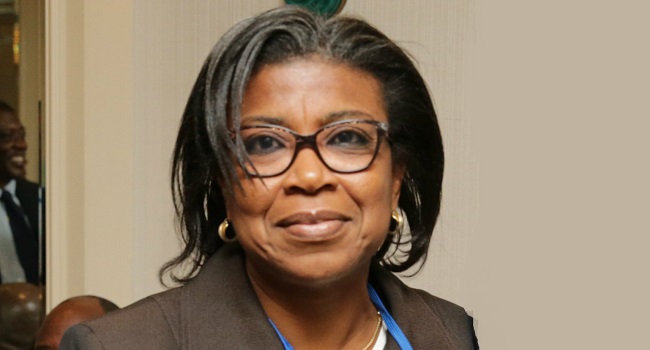Business
DMO DG, Oniha, urges Buhari to address petrol subsidy, insecurity over low revenue

The Debt Management Office (DMO) Director-General, Patience Oniha, has said the Federal Government can increase its low revenue and reduce debt by addressing petrol subsidy and ramp up crude oil production.
Oniha told NAN on Wednesday that the subsidy payment has significantly increased Nigeria’s annual budget deficits, and lack of revenue would continue to compel the government to borrow new loan and increase the public debt stock.
Other issues that need to be addressed according to Oniha, in order to improve the country’s revenue, are crude oil theft and pipeline vandalism, insecurity and inflation.
“The DMO has continuously maintained its position on the need to raise revenue.” she said, adding, “One issue to be addressed is the petrol subsidy which has significantly increased annual budget deficits and ultimately, increased the level of new borrowings and the public debt stock.
“There is a vital need to ramp up crude oil production and end crude oil theft and pipeline vandalism to meet oil revenue targets, especially in the light of rising crude oil prices.
“Other structural issues such as insecurity, inflation, infrastructural deficit and foreign exchange shortages adversely affecting the business environment need to be resolved.” The DMO boss said.
Oniha explained that Nigeria has been running budget deficits for decades, and it’s time to focus on revenue, which has a GDP ratio of 6.3 percent, placing the country on 194 spot out of 196 countries on revenue to GDP ratio list.
Read also: OPC opposes fuel subsidy removal, urges Buhari to fulfill campaign promises
“How much revenue is Nigeria generating? Statistics show that relative to other countries, Nigeria’s revenue is low.” Oniha said, explaining further that, “The World Bank’s World Economic Outlook for 2020 showed that Nigeria with revenue to GDP ratio of 6.3 percent was ranked at 194 out of 196 countries covered.
“The DMO has repeatedly emphasised the need to grow revenues significantly in order for a debt to be sustainable.
“It is advisable for the media and public analysts to begin to focus attention on Nigeria’s revenue generation.
“Revenue is the way to go and that is how countries develop and use borrowing to augment revenue shortfalls now and again.
“Nigeria has been running budget deficits for decades; it is about time to shift to balanced budgets and even surplus budgets.” the DMO DG said.
With Nigeria’s total public debt hitting N41.6 trillion at the end of Q1 2022, rising by N2.04 trillion, from N39.56 trillion reported at the end of December 2021, Oniha said, “Public debt has grown over the last years as the government borrowed to meet major revenue shortfalls, increased spending on security and infrastructure, as well as funding on health due to the COVID-19 pandemic.”
She further stated that, “The levels of new borrowing to meet these needs are often captured in the annual appropriation acts and medium-term external borrowing plan (MTEBP).
“Although it looks obvious, one of the things omitted in the analyses by experts is that new borrowing will automatically translate to higher debt stock and debt service levels.”
Join the conversation
Support Ripples Nigeria, hold up solutions journalism
Balanced, fearless journalism driven by data comes at huge financial costs.
As a media platform, we hold leadership accountable and will not trade the right to press freedom and free speech for a piece of cake.
If you like what we do, and are ready to uphold solutions journalism, kindly donate to the Ripples Nigeria cause.
Your support would help to ensure that citizens and institutions continue to have free access to credible and reliable information for societal development.






















